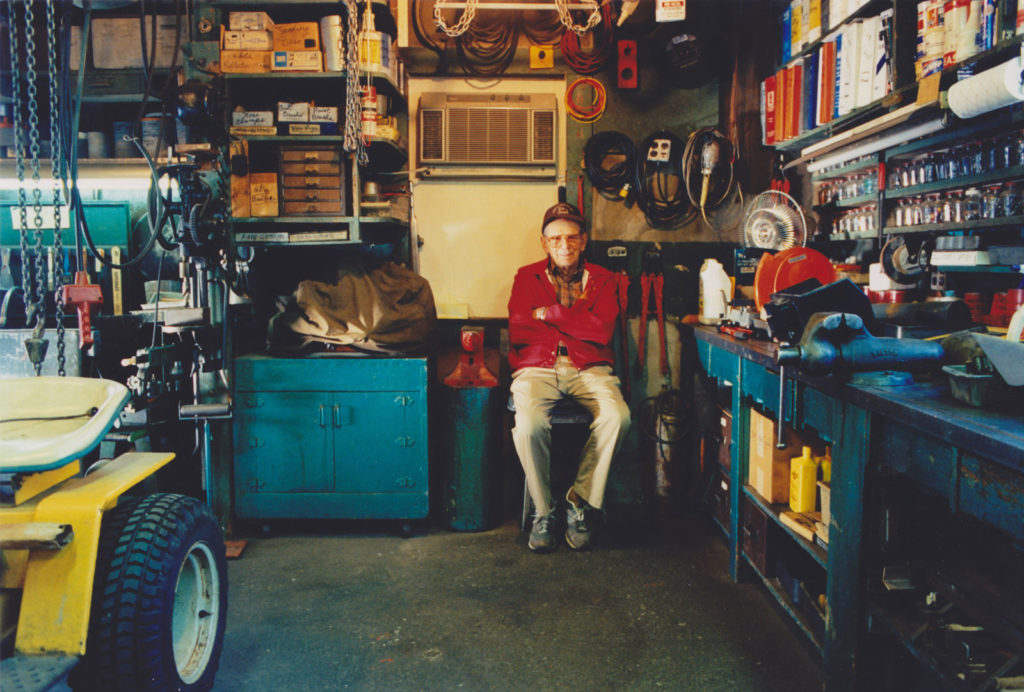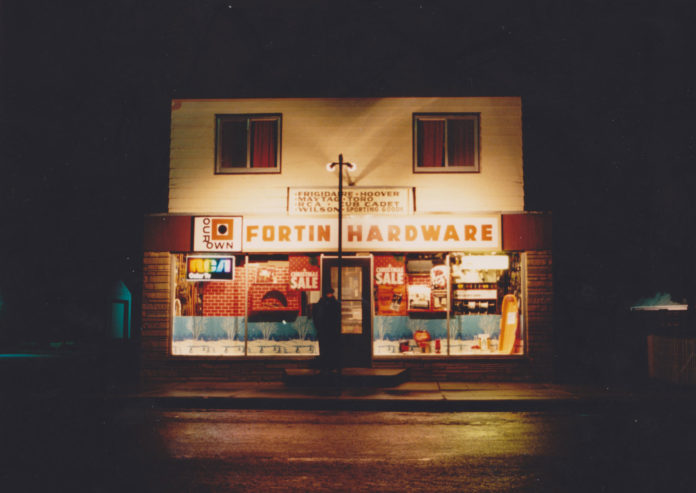The days of generational family-owned businesses is waning in many parts of the state, but Hamel is hanging on to that small town atmosphere. Farmers State Bank of Hamel just celebrated its 100th year in business last month with four generations of Dorweilers at the helm.
Although Fortin Hardware is no longer in business, the Fortin family continues to make a new kind of history in Hamel. More on that in a future issue of LocalTies.
In the 1990s Elizabeth Weir wrote for Weekly News, a newspaper that served the western metro and has since morphed into Lakeshore Weekly News. In September 1994 she covered the iconic Fortin Hardware store history, a story which she has given permission to reprint excerpts here. She interviewed Paul Fortin, who has since passed away in 2007. Bittersweet, 2007 also marks the year the last owner, Mark Bryant, closed Fortin Hardware’s doors.
From Weekly News, August 1994 In Celebration of Fortin Hardware’s 75th Anniversary
Excerpts by Elizabeth Weir
Since 1919 when Albert Fortin cleared a corner of the garage in which he kept his milk truck and let folks know he had hammers, planes, spirit levels and alfalfa seed for sale, Fortin Hardware has served Hamel and its surrounding communities for 75 years.
Albert’s eldest son Paul, now 84 and president of the family-owned store, worked for his father all his life and remembers in vivid detail the story of the Fortin family business.

“Dad was born in the Fortin farmhouse in 1876,” says Paul. “It stood where the Hamel water tower is now.” As a young man, Paul’s father delivered mail on the Corcoran route and drove a horse-drawn buggy in summer and a sleigh in winter. “He had a charcoal burner on that sleigh to keep his feet from freezing when it got real cold in January,” Paul tells me.
Then the Midland Lumber and Coal Company built a lumber yard near the Hamel rail depot early in the century to serve the new farms that were being hacked from the virgin land. “The company needed a manager, and Dad tried for the job and got it,” says Paul. “He got paid for unloading the lumber and hauling it up the hill to the yard with a team of horses. Dad only had a grade school education in the one-room schoolhouse in Hamel, but he was getting the feeling of buying and selling,” says Paul, bidding me to take note.
“The farmers were building barns and machine sheds and modernizing their barns with stanchions, manure carriers and drinking cups,” Paul tells me. To help the farmers, Albert used to let a farm equipment company in the city know each time he sold barn-building lumber.
“Well, the salesman became a good friend of Dad’s,” continues Paul. “This went on a couple of years, and the salesman said to Dad, ‘Albert, you should be in business for yourself.’ ‘I’ve got no money,’ Dad told the salesman, but it set Dad thinking.”
Not long afterwards, Albert Fortin took his first uncertain step into business when he undertook to deliver a load of barn equipment to a farmer. “Dad made a profit,” Paul says, smiling. “Well, he thought that was pretty nice, and he sold a lot of equipment after that — John Deere horse-drawn plows, rakes, binders and manure spreaders. He sold dynamite for removing tree stumps, too, and kept 1,000 pounds of it stored out in the woods on the farm in a concrete magazine,” says Paul, shaking his head. “You couldn’t do that now.”
It was at this time that Albert Fortin first cleared a corner of his garage and began stocking and selling the bits and pieces of hardware that are so essential to a busy farming community.
“Dad had an eye for the future,” Paul says. “He bought property on Main Street in 1910 and built a grocery store on the corner for his brother, Philip. Dad knew if he leased the store for 20 years, it would pay for itself,” explains Paul. The original building was square with two stories. “Just like a box,” he says, showing me with his hands.
“In 1926 Dad made a deal with the creamery to buy himself a truck if they would give him a contract to haul their cream and butter to the Ewald Dairy in Minneapolis,” he says. “They used the train ‘til then, but the butter and cream turned sour in the summer if the train was late.”
When Paul graduated from Wayzata High School in 1928, he took over the milk truck route from his dad. “I used to go straight down Route 9 through Robbinsdale to Minneapolis. That milk route was a Godsend to the hardware store,” he says, wagging a finger at me. “You’ll see why when I get that far with the story.”
Albert was selling farm seed, implements and general hardware out of a corner of his garage, with his wife running over from the house to help customers. When electricity came to Hamel in time for Christmas in 1929, Albert added wire to his stock, and Paul’s brother, Lloyd, learned to wire homes during his vacations from seminary school.
“Pretty soon people came to Dad asking to have their houses wired,” says Paul. When Lloyd became a priest, Dad said to me, ‘This is your job now, Paul.’ I knew nothing, driving a truck all day,” Paul shakes his head. “But I learned, I had to.”
Years later, Paul became a licensed journeyman and then, in 1963, a master electrician. His two sons followed suit and currently run Hamel Electric.
Paul tells me how his father added a one-story extension on to the back of the grocery store. “Then he put on a porch and, in 1934, when Isabel and I got married,” says Paul, “he added a five room apartment. It was Depression time. Hot — 105 degrees with a south wind blowing day and night. I got no salary from Dad, but he was good to us. We had somewhere to live and good food. We lived in that apartment for 14 years and were as happy as if we lived in a mansion,” he says, his eyes distant for a moment.
The business grew, and Paul explained the significance of the milk route. “I drove the milk truck into town every day, see, and I could bring out anything a farmer needed the next day. Well, that was pretty nice service out here in Hamel, and it meant Dad didn’t have to carry a big inventory. Now you know why the milk route was so important,” Paul says, again wagging his finger at me.
“One day, a salesman stopped by and said to Dad, ‘Too bad you aren’t on Main Street, Albert.’ That got Dad thinking, so he gave Philip one year’s notice with the grocery store,” Paul tells me.
Philip’s 20-year lease was up, and Albert moved his growing hardware business from the cramped garage into his Hamel Main Street store. That was in 1932, and the now familiar “Fortin Hardware” sign has hung above the store ever since.
Throughout the 1930s, the pioneer hardware store sold big John Deere farm tractors. But in 1939 the company canceled their contract with Fortins.
“John Deere was frustrated that Dad wouldn’t buy a whole carload of tractors,” Paul tells me. “Dad said he could go broke buying that many. He’d worked too hard to risk everything, and he said to me, ‘Time we got out of the implement business.’ Then a young guy in a bow tie came to the store,” he continues. “He was from Allis Chalmers, and he made Dad an offer.” The Allis Chalmers salesman asked Albert Fortin to keep one tractor in the store for a month, and Albert agreed. “Then Fred Schmidt (a farmer) came in and said, ‘Paul, I hear you’re selling Allis Chalmers, and my old Fordson just wore out.’”
Paul and his friend, Fidel Theis, took the Allis Chalmers tractor to the Schmidt farm where the old tractor was hooked to a two-bottom plow and stuck in the dirt. “We hooked the Allis Chalmers to that plow, put it in gear and away it went, just like nothing,” Paul laughs. “We sold it right then.”
Fortins sold a lot of Allis Chalmers equipment after that, and they serviced all the machinery they sold. Much of that work fell to Paul, who still loves to tinker with engines.
When Highway 55 came through in the 1950s, just below the rise on which the town is built, Hamel farmers began selling their land to developers and, as the community changed, Fortin Hardware changed. Lawn tractors and push mowers replaced farm implements, but still the store repairs the equipment it offers its customers.
“After Dad died in 1963 it was hard,” Paul remembers. Albert had been the driving force behind the store. But Paul and his brothers, Gerald and Kenneth, and his sister, Joanne, took over and ran Fortin Hardware with Gerald’s wife, Dorothy, acting as manager.
It remains a special store with an earthy honesty about it, and people who can’t find things in modern hardware stores often find their way to Fortins.
“I love that place,” says Medina resident Graciela Gonzalez. “I wanted a barn magnet to pick up nails after the blacksmith’s been. No one knew what I was talking about, but when I walked into Fortins, they knew immediately what I wanted. And, what’s more, they had one.”
Fortin Hardware closed its doors in 2007. Rusted Nail recently celebrated their Grand Opening in the iconic Fortin Hardware building at 155 Hamel Road. The Hamel Hawks baseball field at Hamel Legion Park is named after the subject of Liz Weir’s story, the Paul Fortin Memorial Field.







